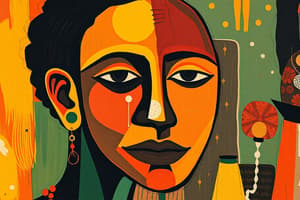Podcast
Questions and Answers
What is the primary focus of anthropology according to the goals outlined?
What is the primary focus of anthropology according to the goals outlined?
- To develop government policies
- To study the effects of culture on government systems
- To analyze international politics
- To describe and analyze the biological evolution of humanity (correct)
Which aspect of culture is emphasized in the definition provided?
Which aspect of culture is emphasized in the definition provided?
- Shared attitudes and beliefs (correct)
- Religious practices
- Economic systems
- Political ideology
What is one of the goals of political science mentioned?
What is one of the goals of political science mentioned?
- To immerse in current affairs (correct)
- To discover cultural similarities
- To produce new knowledge of human behavior
- To analyze biological diversity
Who is recognized as the father of modern Philippine painting?
Who is recognized as the father of modern Philippine painting?
What is a key feature of the Japan-Philippines Friendship Garden?
What is a key feature of the Japan-Philippines Friendship Garden?
Which of the following works highlights the use of inexpensive local materials?
Which of the following works highlights the use of inexpensive local materials?
What is a significant celebration mentioned in Dagupan City?
What is a significant celebration mentioned in Dagupan City?
What type of research is anthropology NOT focused on?
What type of research is anthropology NOT focused on?
What is the primary focus of anthropology?
What is the primary focus of anthropology?
What is one of the goals of political science?
What is one of the goals of political science?
Which field of anthropology focuses on the study of human origins and development?
Which field of anthropology focuses on the study of human origins and development?
What is the significance of ethnography in anthropology?
What is the significance of ethnography in anthropology?
Which of the following describes linguistic anthropology?
Which of the following describes linguistic anthropology?
What does cultural anthropology primarily examine?
What does cultural anthropology primarily examine?
How does political science aim to protect individual rights?
How does political science aim to protect individual rights?
What ancient civilization is recognized for its foundational contributions to political science?
What ancient civilization is recognized for its foundational contributions to political science?
What does anthropology primarily focus on?
What does anthropology primarily focus on?
Which city is known as the 'Queen City of the South'?
Which city is known as the 'Queen City of the South'?
Who is recognized as a prominent American anthropologist known for historical particularism?
Who is recognized as a prominent American anthropologist known for historical particularism?
What is the focus of sociology?
What is the focus of sociology?
What does the term 'sibu' refer to in the context of Cebu City?
What does the term 'sibu' refer to in the context of Cebu City?
What major influence shapes the study of anthropology in America?
What major influence shapes the study of anthropology in America?
Which aspect is NOT typically studied in history?
Which aspect is NOT typically studied in history?
Which city is referred to as the 'King City of the South'?
Which city is referred to as the 'King City of the South'?
Which factor is NOT mentioned as a significant reason for cultural variations?
Which factor is NOT mentioned as a significant reason for cultural variations?
What does cultural variation primarily refer to?
What does cultural variation primarily refer to?
Which of the following is NOT one of the goals of sociology mentioned?
Which of the following is NOT one of the goals of sociology mentioned?
What is included in the definition of culture?
What is included in the definition of culture?
What does social change refer to?
What does social change refer to?
In which context is the International Rice Research Institute (IRRI) relevant?
In which context is the International Rice Research Institute (IRRI) relevant?
Who was Fidel V. Ramos?
Who was Fidel V. Ramos?
What does 'social difference' refer to?
What does 'social difference' refer to?
What does Historical Particularism emphasize in understanding cultures?
What does Historical Particularism emphasize in understanding cultures?
Which belief system focuses on the purpose of cultural elements and practices?
Which belief system focuses on the purpose of cultural elements and practices?
Which of the following values refers to the significance we give to people in our lives?
Which of the following values refers to the significance we give to people in our lives?
What is the defining characteristic of norms in society?
What is the defining characteristic of norms in society?
Which Filipino value aspect relates to one's honor and emotions?
Which Filipino value aspect relates to one's honor and emotions?
Which of the following is NOT a principle of the Halaga value system?
Which of the following is NOT a principle of the Halaga value system?
Cultural Materialism asserts that culture is influenced by which of the following factors?
Cultural Materialism asserts that culture is influenced by which of the following factors?
What does the term 'Diwa' signify in Filipino culture?
What does the term 'Diwa' signify in Filipino culture?
Flashcards are hidden until you start studying
Study Notes
Anthropology
- Derived from the Latin term “anthropologia,” meaning the study of humanity.
- Rooted in the Greek word "anthropos," which translates to "human being."
- Explores human beings and their ancestors in relation to physical attributes, environment, social relations, and culture.
- Ethnography is a research method used by anthropologists involving long-term participant observation.
Fields of Anthropology
- Biological or Physical Anthropology: Studies human origins through genetics, race, evolution, fossils, and primates.
- Cultural Anthropology: Examines living societies, including their religions, languages, and traditions.
- Linguistic Anthropology: Focuses on the evolution of language and its connections to societies.
- Archaeology: Investigates material remains from past human activities, analyzing social systems and cultural elements.
Anthropology Goals
- Identify commonalities and differences among cultures.
- Generate new knowledge about humanity’s behavior and diversity.
- Understand both biological evolution and cultural development.
Political Science
- Systematic study of government, politics, and political power.
- Emphasizes political theory, philosophy, ideologies, public management, human rights, and international relations.
- Originated from ancient Greek thought.
Goals of Political Science
- Enhance citizen engagement and awareness.
- Maintain social order and harmony among groups.
- Safeguard individual rights and promote cooperation.
Sociology
- Analyzes society, social interactions, and the effects of human behavior.
- Originates from the French word “sociologie,” meaning "companionship."
Culture
- Encompasses beliefs, languages, food, and practices shared within a community.
- Cultural variation arises from distinct behaviors exhibited by different cultures.
Significant Reasons for Cultural Variations
- Environment: Inhabitants adapt to local conditions for survival.
- Isolation: Societies that minimize interaction develop unique cultural traits.
- Technology: Availability of tools influences social interactions and values.
Society and Social Dynamics
- Society consists of groups sharing laws, rights, and resources.
- Social differences highlight dissimilarities among individuals based on characteristics.
- Social change refers to the transformation of society and human interaction over time.
Filipino Value Systems
- Halaga (Value): Represents the importance given to relationships, encapsulating self-worth and compassion.
- Asal (Behavior): Evident in interpersonal conduct, emphasizing emotional bonds and honor.
- Diwa (Spirit): Pertains to the inner self, intertwining emotion and reason.
Norms
- Norms are accepted standards of behavior within society.
- Laws regulate conduct, representing formalized norms ratified by the government.
Historical Context
- Historical particularism emphasizes that each society has a unique cultural history shaped by various influences.
- Major contributors to anthropology include Franz Boas, who focused on human culture and historical particularism.
Cities of Interest
- Davao City: Known as the king city of the south and for its durian production.
- Baguio City: Highlighted as the summer capital of the Philippines, known for its rich cultural landscape and urban planning by Daniel Hudson Burnham.
- Cebu City: Recognized as the oldest city, originally a Spanish settlement, foundational for trade in the Philippines.
- Dagupan City: Identified as the Bangus Capital with notable historical sites and cultural heritage.
Prominent Figures
- Fidel V. Ramos: The 12th President of the Philippines, born on March 18, 1928.
- Victorio C. Edades: National artist known as the father of modern Philippine painting.
- Leonora Rivera: Historical figure noted as Rizal's greatest love.
International Relations
- The study of interactions between nations, focusing on governance and foreign policies in a globalized context.
Studying That Suits You
Use AI to generate personalized quizzes and flashcards to suit your learning preferences.




